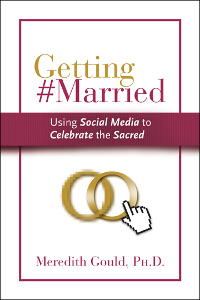Today we are excited to welcome Meredith Gould, author and social media evangelist, to Together for Life Online. Meredith is the author of the book, Getting #Married: Using Social Media to Celebrate the Sacred. In a world increasingly plugged-in and connected via social media, this topic comes at a critical time for couples preparing for marriage as well as those who are already married. She has some interesting ideas about integrating social media into all facets of weddings and marriage. Enjoy.
How can couples effectively use social media to prepare for their marriage?
While it may seem like an exaggeration, I believe every social media platform has the potential for effective use by couples preparing for marriage—and I do mean marriage in addition to wedding prep.
 In Getting #Married: Using Social Media to Celebrate the Sacred, I explain how my husband and I used Facebook, Twitter, and YouTube to allow more people to participate in the wedding planning process. We also used UStream so friends could attend online, and CoverItLive to capture and archive blessings we received via tweets. I like to believe I’ve made a strong case not only for the ease and efficiency of using social media, but also the power it has to revive the public nature of sacraments.
In Getting #Married: Using Social Media to Celebrate the Sacred, I explain how my husband and I used Facebook, Twitter, and YouTube to allow more people to participate in the wedding planning process. We also used UStream so friends could attend online, and CoverItLive to capture and archive blessings we received via tweets. I like to believe I’ve made a strong case not only for the ease and efficiency of using social media, but also the power it has to revive the public nature of sacraments.
The wording of your terrific question prompts me to comment also about how couples might use social media for their marriage prep process. For example, I’d love to see parishes set up a Facebook group for couples involved with the pre-Cana process, providing a safe (and convenient) place for people to chat about hopes and concerns with others preparing for marriage. I think this would be a fantastic use of social media and a Facebook group would provide privacy not currently available on a public page.
How can married couples continue to communicate effectively with social media tools?
Some people think it’s weird for couples to use social media to communicate with one another, viewing it as an example of laziness or emotional drift. I prefer to think of social media as modern “intercom” system.
My husband and I use Twitter to check in with one another during the day and, no joke, during the evening when we’re both at home. And we’ve been known to do this in public, which then becomes an opportunity for friends to engage with either or both of us. Doing so broadens the circle of our life together and allows us to experience support from others, even if the support is simply a tweet saying, “make the meatloaf, you know he loves it!”
What are the challenges that technology and social media bring to marriage and family?
Like everyone else paying close attention to how social media is transforming daily life, I’d say the key challenge involves time. But does engaging with social media hijack time from face-to-face interactions and activities? Not necessarily. After-school programs and staying late at work also have the potential to take couples’ time together and undermine family life.
I think it’s important to look at how and when social media is used. I think these tools work best when viewed as yet another way to engage with the world. We’ve already learned how to integrate the telephone and e-mail into daily life, so we know how to do this. Let’s not make social media into something different, separate, or special—or intrinsically evil!
What advice would you give to individuals who suffer from an addiction to social media?
Addiction is a complex phenomenon, one that we now know may involve brain biochemistry issues. Plus there’s a difference between physical addictions and what are known as “process” addictions. I’d also note that it’s rare to find someone with only one addiction. The person who become authentically addicted to online activity probably has at least one other addiction.
Before labeling someone as addicted to online activities, which may include social media, I’d want to know: Has the person’s life become “unmanageable” because of online activity? Are work, bill-paying, and other activities being neglected? How about eating, sleeping, and basic hygiene? Has the person become isolated? These are signs of addiction that will require professional intervention rather than nagging or threats by aggrieved family or friends. Your readers might find one of my other books helpful in this domain: Staying Sober: Tips for Working a Twelve-Step Program of Recovery.
Meredith Gould (@meredithgould), author of Getting #Married: Using Social Media to Celebrate the Sacred and seven other books, is a blogger, working writer, and digital strategist who provides consultation to churches and other mission-based organizations. You can learn more about her on her website.









It’s interesting that couples would go to social media to promote their weddings. I have always favored a more intimate arrangement but to each their own.
I know couples who use social media (Facebook and Twitter, mostly) to communicate with each other during the day… and when they are in the same house. I would caution against couples doing this too much. The public nature of it all can be really inappropriate – and annoying – for the rest of us (yes, I do ‘hide’ many of these friends). That’s what text messaging is for, people! I worry for some couples it becomes a source of exhibitionism, pride, and narcissism… not helpful for an intimate relationship.